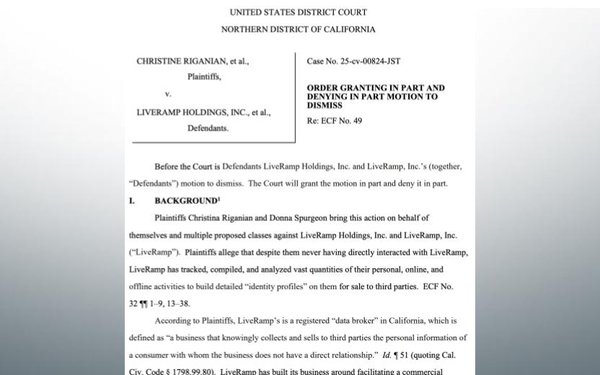
Siding against LiveRamp, a federal
judge has ruled that the data broker must face a variety of privacy-related claims over its alleged data collection practices.
"Drawing all reasonable inferences in
plaintiffs’ favor, the court finds that the tracking of individuals’ activity across thousands of websites, combined with extensive offline records gathered over decades, to generate
uniquely identifying profiles on those individuals is sufficient to allege intrusion into privacy," U.S. District Court Judge Jon Tigar in the Northern District of California said in a ruling issued
late last week.
The decision stems from a class-action complaint filed earlier this year by Christina Riganian and Donna Spurgeon. They alleged that LiveRamp "created a network
that tracks in real time and records indefinitely the personal information of hundreds of millions of people."
advertisement
advertisement
Among other claims, they accused LiveRamp of violating federal
and California wiretap laws as well as California's constitution (which says residents have the right to privacy), and of engaging in "intrusion upon seclusion" -- a privacy claim that can be brought
in California, and involves "highly offensive" activity.
"LiveRamp engages in dragnet-style collection and interception" of people's internet activity, and also gathers details
about people's offline activity, they alleged.
"LiveRamp creates comprehensive identity profiles based on this online and offline data, which constitute precisely the sort of
'cradle-to-grave profiles' the right to privacy under the California Constitution was created to constrain," the complaint alleged.
LiveRamp urged Tigar to dismiss the bulk of
the claims at an early stage of the case.
"Plaintiffs ask the Court to ... condemn much of what makes targeted advertising work," LiveRamp argued in a motion filed with Tigar
in May.
"If adopted, plaintiffs’ theory would impose sweeping new rules for the online advertising industry and deem illegal longstanding practices that help keep the
internet free," the company wrote.
LiveRamp also argued that the complaint's allegations, even if proven true, wouldn't show that the company engaged in "highly offensive"
activity.
"Plaintiffs plead no facts showing that LiveRamp disclosed anything sensitive about them to a third party in a way that caused embarrassment or injury," the company
wrote.
"There are no well-pleaded allegations that LiveRamp has ever disclosed information in a personally identifiable way... Mere speculation that this could theoretically
happen is insufficient," LiveRamp added.
Tigar rejected those arguments for now, noting that a different federal judge in the district allowed web users to proceed with some similar privacy claims against Oracle.
Oracle -- which shut down its ad business last year -- agreed to settled the privacy lawsuit for $115 million.
A LiveRamp representative stated Tuesday that the company will
have "many opportunities to show deficiencies in the plaintiff's asserted facts and theories," and that it looks forward "to ultimately prevailing."